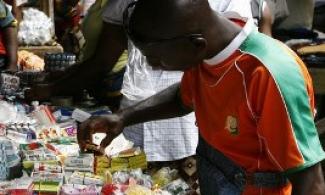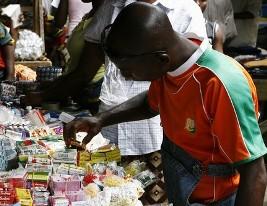
Fake Drugs Flood Africa, As Nations Squabble Over Laws
May 22 (GIN) - Counterfeit medicines pose a serious threat to public health. Perhaps 15% of the global drug supply is counterfeit, rising in parts of Africa and Asia to over 50%.
But efforts at making counterfeiting a crime and pursuing perpetrators across national borders have been stymied by foot-dragging among western nations and drug companies, among others. Recommendations made at a Conference of Experts on the Rational Use of Drugs in Nairobi in 1985, have still not given a green light to the World Health Organization to regulate fake drugs, as is done with tobacco and currency counterfeiting.
“The drug industry could contribute much more to the fight against fake drugs,” wrote The Lancet medical magazine in an article titled “Fighting fake drugs.” Drug companies currently maintain vital information about counterfeiting, the categories of drugs being falsified, and the locations where fake drugs are being marketed. But their database is confidential. “Evidence of a dangerous epidemic is thus being hidden by industry and this situation must change.”
Fake drugs with no malaria-fighting agents can lead to deaths, and those with some active ingredients - but not enough to fully kill all parasites - are also problematic because they promote resistance that can eventually outsmart medicines and render them useless.
Resistance is building in Asia to artemisinin-based drugs, the only effective medicine against malaria, which could eventually spread to Africa and many people would die. Currently, malaria kills an estimated 2,000 children every day in Africa. Some 3.3 billion people worldwide are at risk of getting infected.
"We feel a sense of emergency considering the impact these medicines can have," said Gaurvika Nayyar, of the Fogarty International Center at the U.S. National Institutes of Health.
More labs are needed worldwide to test for fake drugs - only three out of 47 malaria-plagued countries in Africa are equipped to do so.
South Africa To Demand Lables On Israeli-Made Goods
May 22 (GIN) – Products made in Israel would be distinguished from those made in the occupied Palestinian territories under a proposal that is drawing charges of anti-Semitism against the trade minister, Rob Davies.
Davis strongly rejected the charges leveled by the Israeli foreign ministry and raised at a press conference this week when he was asked by an Israel TV reporter whether he was an anti-Semite.
The Financial Times quoted an Israeli foreign ministry official as saying the proposal would "stamp, name and shame Israeli products on an uncertain basis" and that "singling out one country and stigmatizing its products is a move with racist characteristics".
But according to the minister, South Africa was "not unique" in requiring that consumers be given accurate information about the country of origin of products, being, in this case, either Israel or the occupied territories. South Africa only recognizes the borders of Israel as those prior to 1967 — not including the Palestinian occupied territories — and supports a two-state solution for the conflict.
Davies’ move follows a boycott campaign coordinated by Palestinian and South African groups such as BDS (Boycott, Divestment, Sanctions) South Africa, Open Shuhada Street, Lawyers for Human Rights, among others. The groups raised questions about products made in illegal Israeli settlements in the West Bank but labeled “made in Israel.”
Meanwhile, in Denmark, Foreign Minister Villy Soevndal stated this week that the country will begin labeling all goods from West Bank settlements “which are illegal according to international law.”
Elsewhere in South Africa, the University of KwaZulu-Natal canceled a lecture by Israel’s deputy ambassador, Yaakov Finkelstein, citing negative publicity it would bring the institution. Activists are seeking a full academic boycott, a position endorsed by poet Breyten Breytenbach, Prof. John Dugard, and Archbishop Desmond Tutu among others.
Protestors Storm National Palace Of Mali And Viciously Beat President
By Fungai Maboreke
May 22 (GIN) – Just hours after a West African peace committee flew out of the country feeling success at their venture, hundreds of Malian supporters of the recent military coup invaded the national palace and beat the interim President Dioncounda Traore within an inch of his life.
Prime Minister Cheick Modibo Diarra expressed deep dismay at the attack. "I am ashamed to relate what happened this morning... I'm asking the young people who protested today not to protest again. I have understood their complaints and I'll make sure that the right people hear about them.”
It is not clear how the protestors slipped past the soldiers guarding the Presidential residence.
The mediators from the Economic Community of West African States (ECOWAS) had been brokering a deal with coup leaders to accept a Traore-led 12-month transition back to democratic rule.
Traore was selected to replace Mali’s former Prime Minister, Amadou Toure, who was ousted March 22 by a junta led by Capt. Amadou Haya Sanogo who blamed Toure for failing to quell an uprising of Tuareg people in the north of the country. Sanogo was U.S.-trained, having received a professional military education including basic officer training while in the U.S.
In exchange for letting the interim president serve a full year. Sanogo won a score of generous perks from the ECOWAS group. These included status and privileges normally accorded former heads of state, including a pension for life, a mansion, transport and an allowance.
Observers said the thousands-strong street protest in Bamako which preceded the palace invasion had the markings of youth leader Oumar Mariko, who hailed the coup as ushering in an Arab Spring-style revolution.
A 3,000-strong standby force from the west African region is ready for deployment if Mali requests it. w/pix of protestors in presidential palace
African Liberation Day Meets Resistance In Caribbean
May 22 (GIN) – A day marking the First Conference of Independent States, held in Accra, Ghana, in 1958, and heralding liberation movements and the Organization of African Unity, will be celebrated on the continent, in the Caribbean, in Europe and the U.S., May 25-26.
"African Freedom Day," symbolizes the determination of the people of Africa to free themselves from foreign domination and exploitation, notes www.africanliberationday.net.
However this year, Caribbean efforts to make May 25 a national public holiday ran into some resistance on the island nation of Dominica.
Participants in a recent Dominica News Online poll voted 417 against to 309 in favor, when asked whether or not the day should be declared a public holiday.
Lawyer/activist Henry Shillingford, one of the holiday's advocates, expressed disappointment.
“It’s a very important issue about the holiday because we’re (CARICOM, OECS) African governments, and as I have reminded two prime ministers, both this one (Roosevelt Skerrit) and the one in St Vincent (Dr Ralph Gonsalves), is that they are prime ministers of countries that are predominantly African, and that there is no holiday recognizing Africa in the West Indies.”
The activist, a Rastafarian, has recommended that African Liberation Day be combined with the St. Isidore holiday on May 25. “People could go to church and celebrate Africa,” he suggested.
Meanwhile, the African Union will host the first ever Global African Diaspora Summit in Johannesburg, South Africa from May 23-25 under the theme: “Towards the Realization of a United and Integrated Africa and its Diaspora.”
The summit aims to create sustainable partnerships between the African Diaspora and the African continent through a realizable Program of Action; create sustainable dialogue and partnerships; strengthen Pan-African solidarity for a better Africa and the Diaspora.
Finally, the California Black Agriculture Working group will co-host Africa Day to demonstrate the ongoing contribution of people of African ancestry to the bounty of agriculture excellence in the "Greatest Garden in the World," the Central Valley of California. w/pix of H. Shillingford
